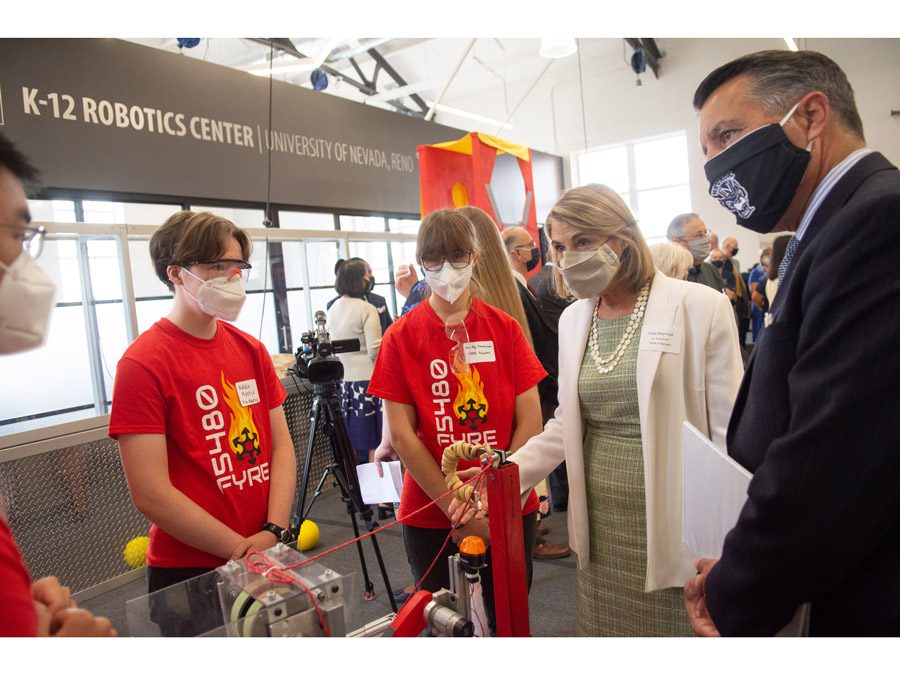Local and state government officials and professionals from Tesla and the Economic Development Authority of Western Nevada (EDAWN) gathered this morning for the grand opening of the K-12 Robotics Center on the corner of Liberty and Sinclair streets.
The center will be used by students participating in robotics competitions but is open for use by all school-aged children in the region.
The building is owned by the University of Nevada, Reno (UNR), which will oversee the center’s operations. The location for the new center was originally the annex for the Southside Side School, constructed in the 1930s. It was a time when Reno was growing, despite the Great Depression. Now, the building is outfitted with modern technologies that could not have been fathomed at the time of its construction.
Help funding the creation of the center came from Tesla, which retrofitted and installed new heating, ventilation and cooling in the space.
EDAWN also facilitated its development and has added a regional robotics coordinator, Caroline Hanson, to its staff to support programming and connect professionals, teachers and students involved in the region’s robotics-related efforts.
The Robotics Center contains a field lined by a barrier for testing out robots, a smaller Lego robot building space, dozens of power outlets attached to extension cords that drop down from its ceiling and a well-equipped woodshop, for which safety certifications can be obtained. It contains a CNC router, table saw, desktop planar, soldering station, laser cutter, drill press and a suite of power tools among other things.
There’s also classroom space in the Robotics Center, which university officials hope local tech and robotics oriented businesses will use. The idea is to have a space where current professionals can meet with future ones to begin collaborations.
“The community is all coming together—and that’s what needs to happen to create these opportunities.”
Mirdul Gautam is the vice president for Research and Innovation at UNR. He said he was pleased to have a dedicated and well equipped space where students in the community can go to become engaged in science, technology, engineering and math (STEM) education through hands-on experience.
“We didn’t have a place like this in Reno, and now they can all get together and work over here. Seven days a week and 24 hours a day, this place will be open to them,” Gautam said. “If they want to do it, it will be open.”
Finding a time to work from the Robotics Center can be done by contacting the university’s Innevation Center. The ability to schedule times outside of standard business hours is intended to increase accessibility to the center and the tools it contains.
“Things like coding and being one with STEM, this should come as naturally as you learn how to walk and talk because right now, whether in the artist space or the liberal space, connections are so tight,” Gautam said, noting that students across fields of study are increasingly encouraged to have a grasp on evolving technology.
Inspired by robotics
It does come naturally for Tyler Du, a high school senior who’s been on the Fyre Robotics team for the past five years. Du’s team, one of three on hand during the grand opening, competes against others at schools both locally and nationally. It’s open to Washoe County high school students.
“Every year in January we get six weeks to build a robot,” he said. “And then, afterwards, we go to UC Davis to compete.”
Du said he became inspired by robotics in middle school and then watched a demonstration from the Fyre team. He joined it in the eighth grade and now intends to major in computer science, which he said will allow him to build on similar skills to the ones he uses in his role on the team.
The robot Du and his team have been building and demoed at the grand opening can pick up balls from the floor and then lob them into a goal high off the ground. Du’s programming of the robot includes its controls, as well as its autonomous-mode features—which allow the robot to take data from built-in sensors that pick up on things like spatial information and colors to allow it to operate its own controls.
Creating opportunities
Mike Kazmierski, the president and CEO EDAWN, said he and others in his organization see STEM and STEAM (STEM plus an “a” standing for the arts) as essential.
“STEAM training is critical to this region for a lot of reasons,” he said. “One is because the jobs coming here require those skills. And two is that other jobs are going away, and we want our kids to have great jobs.”
Lieutenant Governor Kate Marshall agreed with Kazmierski. She recalled a story about her dad, who also grew up in town.
“My dad grew up in the worst neighborhood in his town, and, at some point, they decided to build a tennis court there. After they built the tennis court, the kids used it to fight,” she said. “The reason was because there were no balls, no tennis rackets and no tennis courses. The point is that it’s not just about having the space. It’s about the fact that they’re bringing in teachers. It’s about the fact that they built out the space, that they have the equipment, that they have the coordinators. It’s about the fact that the resources are here so these kids can see and touch and learn.”
Marshall lauded the collaborative effort between the university, school district, Tesla and EDAWN to get the center opened and operational.
“The community is all coming together—and that’s what needs to happen to create these opportunities,” she said. “That’s why Reno-Sparks does it right. We can say, ‘Here’s a problem,’ and all the pieces of community will step up and say, ‘Yes, we will address that.’”
Updated: A quote from Lt. Gov. Kate Marshall about her father’s youth was updated.

